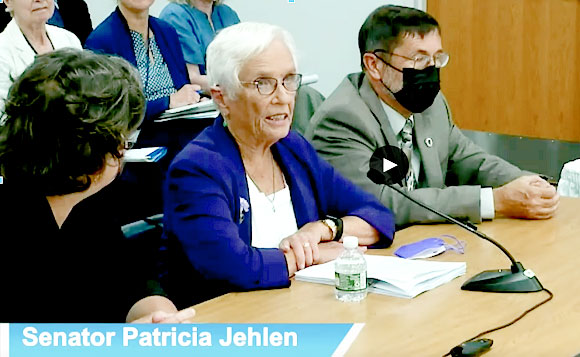 *
*
Last week, Senator Pat Jehlen, who represents Somerville, went to the state Board of Elementary and Secondary Education with Senator Jo Comerford and Representative Jim Hawkins. They asked the Board not to make it harder for the state’s most vulnerable students to pass the MCAS graduation exam and get their high school diplomas.
When the proposal was first made public last spring, the three quickly gathered the signatures of half of the legislature in opposition.
“It was easy to collect the sign-ons from our colleagues because long-standing issues with the MCAS test are widespread,” said Sen. Comerford. She said legislators are hearing “urgent calls for help and action from the people we represent.” It is very rare for so many legislators to sign a public letter to a state agency. Somerville representatives Christine Barber, Mike Connolly, and Erika Uyterhoeven signed the letter. The full letter is here.
Rep. Hawkins, a former 10th grade math teacher, told the board that falling short on MCAS leads students to disengage from school, just as they were about to have an opportunity to discover what really interests them. “When you get to be a junior or senior in high school, you get to take the courses that really energize you, whether it be music, arts, vocational trades, or whatever it is,” he said. “If these students don’t pass the MCAS in 10th grade and they have to take remedial courses, we’re taking that away from them.”
Sen. Jehlen focused on the students who have historically had the most difficulty passing the test to get their diplomas, those who are learning English and are not yet fluent. “English learners have overcome incredible, often life-threatening, obstacles,” she said. “Please don’t add another barrier.” Jehlen’s letter is here.
The legislators’ letter, signed by 98 state senators and representatives, urged the board to reject the proposal from Education Commissioner Jeff Riley. “If the state’s goal is racial and social equity, this is the wrong way to go,” the legislators wrote.
Public comments solicited by the board were also overwhelmingly opposed to making it harder to graduate, with 243 opposed and four in favor. Despite this, the Board voted 8-3 to raise the passing score for MCAS, as well as the score to qualify for an Educational Proficiency Plan. The board’s 11 members are all formally appointed by the governor, but state law provides that one be chosen by students, one by the Parent Teacher Association, and one by the state labor council. Those three all voted against raising the score. The board members chosen by Gov. Baker voted to make the changes.















Reader Comments